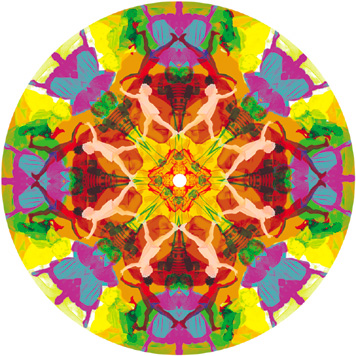
Black to Comm "Levitation/Astoria." 7" Lathe-Cut Picture Disc, design by Marc Richter and Renate Nikolaus. Dekorder Records.
Over the past few months I've been researching a book about current record cover art. Besides hunting down examples of stimulating music graphics, I've also been looking for digital alternatives to the traditional album cover. As downloading threatens to become the main distribution method for recorded music, it is widely believed that the album cover will be replaced by some new online format — perhaps animated — that will make CD packaging redundant. Well, I might be missing something, but I've found nothing in the digital arena that offers a viable alternative to a well-designed CD or vinyl album cover. Instead, I've discovered a grim-faced resistance movement amongst dozens of tiny record labels determined to hang onto physical packaging and expressive cover art, no matter what.
This resistance movement is found mainly amongst independent labels — micro labels — often run by a single individual, and often existing on budgets that would embarrass a shoestring. And what distinguishes so many of them is a deep-rooted commitment to selling physically packaged music with resonant cover art.
It's not worth discussing what the major labels are up to: they haven't got a clue. There used to be five major record labels; when Sony and BMG merged this became four, and now it is hotly predicted that another merger will reduce the number to three. These lumbering conglomerates are doing what they have always done: waiting for someone else to show them the way forward. In the meantime, as they dither and prevaricate, their domain is encircled by Apple, Starbucks, Amazon, WalMart and various corporate entities with the wherewithal to offer digital downloads to an eager public. For anyone who cares about music, this is hardly a heart-warming prospect.
And yet, is the determination of the micro labels to continue producing CD and vinyl packaging anything other than the remnants of a fanboy obsession with recorded music common amongst people who grew up in the pre-digital era? Most of the label owners I've interviewed for my book have talked about the usual teenage interest in band logos, enduring love affairs with New Order album covers, and fixations with the "smell of records." But are we talking about something deeper here? Does music need some sort of physicality to maintain its intrinsic value? If our favourite music merely exists as a sliver of invisible code on a computer, do we lose something?
In a recent Guardian article, "It's a Steal," the novelist John Lanchester wrote about literary copyright. He detailed Google's ambitious attempts to digitize the world's literature. Lanchester has some sharp things to say about the way copyright and intellectual property rights are being eroded in the digital age, but he gives a cautious welcome to Google's plans, and does not foresee the end of books.
"Personally, I think that books are going to be OK, for one main reason: books are not only, or not primarily, the information they contain. A book is also an object, and a piece of technology; in fact, a book is an extraordinarily effective piece of technology, portable, durable, expensive to pirate but easy to use, not prone to losing all its data in crashes, and capable of taking an amazing variety of beautiful forms. Google Book Search is going to be a superb tool for accessing the information in books; but how much of Middlemarch or White Teeth or Tintin in Tibet is information? You can see [ ... ] just how much of the cultural history of books, and their cultural importance, lies in their bookness. This will, I think, dilute the impact of digitization for writers and publishers: even if you could rip an MP3 of Moby-Dick, who on earth would prefer it to a bound copy?"
Lanchester phrase, "an amazing variety of beautiful forms," applies to the best music packaging as much as it does to books. There is an undeniable sense of completeness when music comes with handsome packaging and engaging graphical material.
I download music, and while I have gripes with the poor audio quality of most downloads, I do it happily enough, relishing its instantaneousness and convenience. I tell myself that there's no good reason to need music to be packaged since one of its greatest assets is its lack of materiality — if you really want to enjoy music, listen to it with your eyes closed. And yet, when I analyze my feelings towards the digital files that sit on my laptop, or on my iPod, or on neglected backup discs, I find that I care less about them than I care about the CDs and vinyl discs I own.
An audio file with a thumbnail JPEG of the album cover will never have the resonance — not to mention the commercial value — of a well-made piece of packaging. But if the corporate providers of downloadable music have their way, this is the future of recorded music. Who ever had a love affair with a JPEG?
